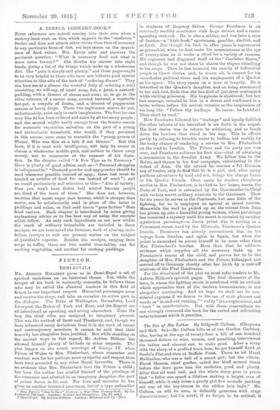FICTION.
IPEMI-ROYALt Ma. A.SHTON Haunts gives us in Demi-Royal a set of spirited variations on an historical theme. Yet, while the temper of his book is eminently romantic, he follows those who may be called the classical masters in this field of fiction in one important respect. Historical personages cross and recross the stage, and take on occasion an active part in the dialogue. The Duke of Wellington, Bernadotte, Lord Liverpool, the Dukes of York and Kent, and the Regent are all introduced as speaking and acting characters. None the less, the chief r451es are assigned to imaginary persons. This was the method of Scott and Thackeray, and, though we have witnessed many deviations from it in the work of recent and contemporary novelists, it cannot be said that their temerity has altogether been justified. But while standing on the ancient ways in this regard, Mr. Ashton Hilliers has allowed himself plenty of latitude in other respects. The plot hinges on the secret marriage of George IV. when Prince of Wales to Mrs. Fitzherbert, whose character and conduct won for her perhaps more sympathy and respect than have been accorded to any other Royal favourite. There is no evidence that Mrs. Fitzherbert bore the Prince a child ; but here the author has availed bine:elf of the privilege of the romancer and allotted to an imaginary daughter the part of prima donna in his east. For hero and narrator he has given us another invented personage, but of a type unfamiliar May Byron's " How -to-Saue* Cookery: a War Time Cookery-Book. 13y the Author of ovtoeue. London: Hodder laud Stoughton. [2a. ed. net.] t pcoai-Reyet. By Ashton Villiers. London : Methuen and Co. [be.] to students of Regency fiction. George Fanshawe is an extremely wealthy commoner with large estates and a corre- sponding rent-roll. He is also a soldier, and has been a man of fashion—a "high buck," sportsman, gambler, duellist, and so forth. But though his luck in after years is represented as proverbial, when we first make his acquaintance at the age of twenty-nine he is under a cloud for a variety of reasons. His regiment had disgraced itself at the " Oastlebar Races," and though he was not there he shares the stigma attaching to his corps. Then be has incurred the enmity of influential people in Court circles, and, to crown all, is suspect for his unorthodox political views and his employment of a Quaker as his agent. The story opens on a note of tragedy. He is betrothed to the Quaker's daughter, and on being summoned to her sick-bed, finds that she has died of jail-fever contracted while visiting prisoners. His happiness is shattered; but her last message, revealed to him in a dream and confirmed in a letter written before his arrival, remains as the inspiration of his long life: "Follow thy leadings. Be brave : be faithful! Thou shalt be used."
How Fanshawe followed his "leadings" and loyally fulfilled the other behests of his betrothed ie set forth in the sequel. His first desire was to return to soldiering, and to break down the barriers that stood in his way. This he effects partly by refusing to knuckle under to bullies. but mainly by the lucky chance of rendering a service to Mrs. Fitzherbert on the road to London. The Prince and his party are won- over, and Fanshawe achieves his first aim--that of obtaining a commission in the Swedish Army. We follow him to the Baltic, and thence in his first campaign, culminating in the defeat of Jena. On the retreat he rescues a fat German boy of twelve, only to fins that he is a girl, and, after many perilous adventures by land and sea, brings his charge home to his Quaker friends. Once again he renders chivalrous service to Mrs. Fitzherbert, is invited to her house, meets the Duke of York, and is entrusted by the Commander-in-Chief with various secret military missions to the Continent. Then for six years he serves in the Peninsula, but sees little of the fighting, for lie is employed on special or secret service. Meanwhile the waif he picked up on the retreat from Jena. has grown up into a beautiful young woman, whose parentage has remained a mystery until the secret is revealed by another mysterious personage—a Jesuit priest who is serving as a Protestant curate hard by the Ellwood% Fanshawe's Quaker friends. Fanshawe has already encountered Lim on his voyage from Sweden, and again in Spain, but when the priest is unmasked he avows himself to be none other than Mrs. Fitzherbert's brother. More than that, he adduces evidence which supplies all the necessary links up to Fanshawe's rescue of the child, and proves her to be the daughter of Mrs. Fitzherbert and the Prince, kidnapped and carried off to Germany shortly after her birth by a cast-off mistress of the First Gentleman.
For the dtinoliment of the plot we must refer readers to Mr. Ashton Hilliers's spirited pages. The dual character of the hero, in whom the fighting strain is combined with an outlook which approaches that of the modern humanitarian, is not altogether convincing. And we hope we shall not be con- sidered captious if we demur to the use of such phrases and words as " in-and-out running," " ruddy " (as a euphemism), and " bosh " as anachronistic. But with these reservations we can strongly commend the book for the varied and refreshing entertainment which it provides.














































 Previous page
Previous page